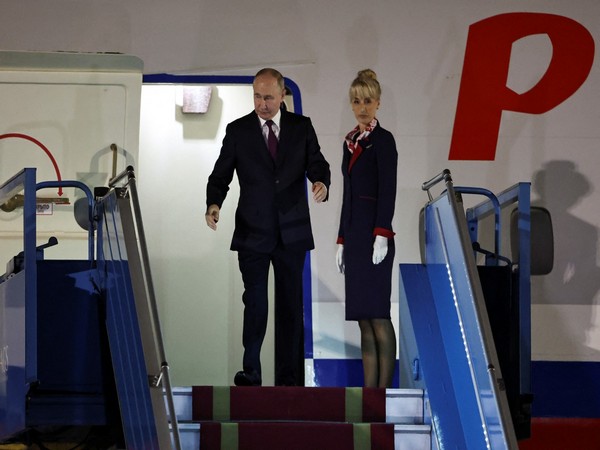Putin's Strategic Pivot: Vietnam Visit Strengthens Asia-Pacific Security
During a visit to Vietnam, Russian President Vladimir Putin aimed to enhance a 'reliable security architecture' in the Asia-Pacific. The visit, which featured multiple agreements and high-level ceremonies, was part of Russia’s pivot to Asia amid Western sanctions over Ukraine, showcasing Vietnam as a key strategic partner.

Russian President Vladimir Putin said he wanted to build a "reliable security architecture" in the Asia-Pacific region during a state visit to Vietnam on Thursday, part of a trip to Asia seen as show of defiance to the West. A day after signing a mutual defence agreement with North Korea, Putin received a 21-gun salute at a military ceremony in Vietnam, was embraced by two of its Communist leaders and lavishly praised by one of them.
Putin had contributed to "peace, stability and development" in the world, Vietnam's president said. Putin's visit has drawn criticism from the United States and its allies, who treat the Russian leader as a pariah and have protested that he should not be given a stage on which to defend Russia's war in Ukraine.
Russia and Vietnam signed agreements on issues including energy, underlining Moscow's pivot to Asia after the West imposed sanctions on Moscow over the conflict in Ukraine. "We are firmly committed to deepening the comprehensive strategic partnership with Vietnam, which remains among the priorities of Russia's foreign policy," Putin was quoted as saying by Russian media.
He was quoted by Russia's TASS news agency as saying the two countries shared an interest in "developing a reliable security architecture" in the region based on not using force and peacefully settling disputes with no room for "closed military-political blocs". At a news conference to wrap up his trip, Putin accused the NATO military alliance of creating a security threat for Russia in Asia, TASS reported.
The 11 pacts signed in Hanoi were not on the same level as the landmark mutual defence agreement in North Korea. But Putin's warm welcome was a public relations achievement for the Russian leader, who has an outstanding International Criminal Court arrest warrant against him over alleged war crimes in Ukraine, charges he denies.
Neither Russia nor Vietnam is a member of the ICC. "Putin's triumphal reception in Hanoi will mark a counter-point to Russia's recent setbacks," said Carlyle Thayer, emeritus professor at the Australian Defence Force Academy, listing the recent Ukraine conference in Switzerland and new European Union sanctions on Russia.
They were the latest Western sanctions imposed on Russia since its full-scale invasion of Ukraine in February 2022, which Moscow calls a "special military operation". Putin's public relations blitz has been helped by the fact that Vietnam, unlike North Korea, has friendly relations with the United States and its allies, Zachary Abuza, a professor at the U.S. National War College, said.
"Although, there was a lot less of the fanfare and performative aspects than in North Korea, this visit was still important for Putin because Vietnam is actually an important actor in the global economy, not some comically evil pariah state," Abuza said. SHARED HISTORY
The military ceremony put on to greet Putin, who was embraced by both Vietnamese President To Lam and Prime Minister Pham Minh Chinh, was the kind reserved for the highest heads of state and rolled out when U.S. President Joe Biden and Chinese President Xi Jinping visited Vietnam last year. The two presidents witnessed the exchange of 11 agreements and memorandums of understanding, including deals on oil and gas, nuclear science and education.
At another event, Lam said Putin continued to lead Russia "overcoming all difficulties and challenges, at the same time contributing to the peace, stability and development in the region and the world." Abuza underlined Vietnam and Russia's shared Communist history, with tens of thousands of Vietnamese cadres - including current members of the Politburo - having trained in the former Soviet Union.
US, EU CRITICISM Vietnam's hosting of Putin was criticised by the EU and by the United States, now an important partner which upgraded diplomatic relations with Hanoi last year and is Vietnam's top export market.
The U.S. State Department said a top U.S. diplomat will visit Vietnam this week to stress Washington's commitment to working with it to ensure a free and open Indo-Pacific. Assistant Secretary of State Daniel Kritenbrink "will also reaffirm the United States' support for a strong, independent, resilient, and prosperous Vietnam," during his visit, it said.
Separately, U.S. Treasury Secretary Janet Yellen said the United States' upgraded partnership with Vietnam did not require Vietnam to sever ties with Russia or China. An EU delegation spokesperson in Vietnam said Hanoi had the right to develop its own foreign policy, but said Russia's war in Ukraine proved Moscow did not respect international law.
Despite concern over the visit from the U.S. and its allies, Hanoi may have correctly calculated it will not suffer material consequences, said Murray Hiebert, a senior associate of the Southeast Asia Program at Washington's the Center for Strategic and International Studies. "I don't think it'll have a long-term impact... the U.S. often gives them a bit of a pass," Hiebert said, noting Washington's heavy reliance on its good relations with Vietnam to counter its rivalry with China in the region. (Additional reporting by Minh Nguyen Vu in Hanoi, Kay Johnson in Bangkok and David Brunnstrom in Washington; Writing by Kay Johnson; Editing by John Mair, Ed Davies, Timothy Heritage and Andrew Heavens)
(This story has not been edited by Devdiscourse staff and is auto-generated from a syndicated feed.)
- READ MORE ON:
- Putin
- Vietnam
- Asia-Pacific
- security
- defense
- Russia
- Ukraine
- agreements
- energy
- sanctions










